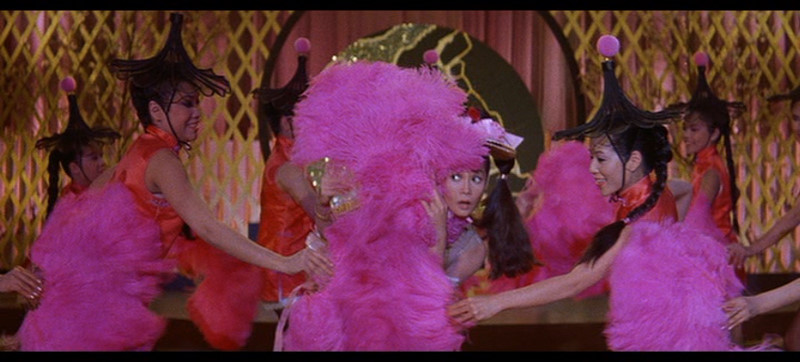![]()
![]()

![]()
![]()
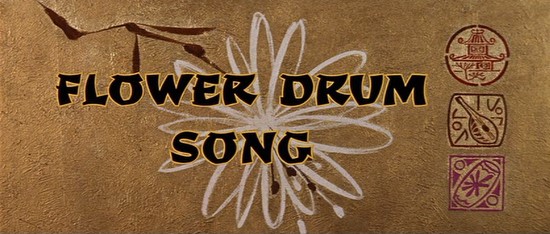
Directed by
Henry Koster
USA 1961
The film version of the Rodgers and Hammerstein Broadway hit, Flower Drum Song is a musical comedy set in San Francisco's Chinatown, concerning old-fashioned Chinese and modern Chinese-Americans clashing over tradition and trying to find romance. Mei Li (Miyoshi Umeki), a Hong Kong picture bride, arrives in San Francisco to meet her husband Sammy Fong (Jack Soo), an Americanized Chinese night-club owner. However, Sammy is already romantically involved with the star attraction of his nightclub show, the sultry singer/dancer Linda Low (Nancy Kwan). He tries to assign his marriage contract to Wang Ta (James Shigeta), a handsome college student living in Chinatown. Ta, however, has his sights set on Linda as well, while Linda's seamstress Helen Chow (Reiko Sato) secretly pines for Ta. Romantic complications result, but nothing that a little singing and dancing can't resolve to the satisfaction of nearly everyone. The film has a great brassy, jazzy score and the best choreography of any of R&H's musicals.
Excerpt from FlowerDrumSong.org located HERE
Posters
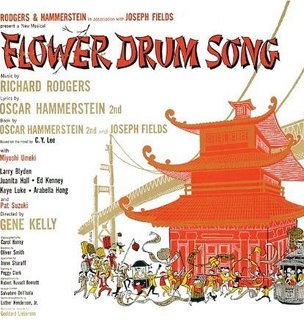 |
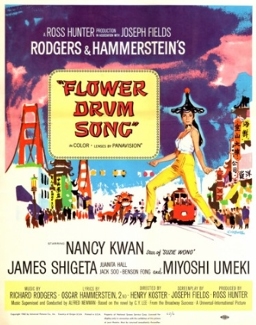 |
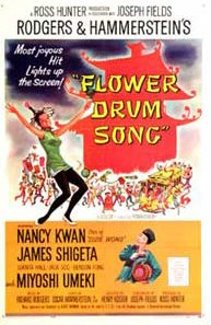 |
Theatrical Release: November 9th, 1961
Reviews More Reviews DVD Reviews
DVD Review: Universal - Region 1 - NTSC
| DVD Box Cover |
|
CLICK to order from: |
| Distribution | Universal Home Video - Region 1 - NTSC | |
| Runtime | 2:10:52 | |
| Video |
2.35:1
Aspect Ratio Average Bitrate: 5.99 mb/s NTSC 720x480 29.97 f/s |
|
|
NOTE: The Vertical axis represents the bits transferred per second. The Horizontal is the time in minutes. |
||
| Bitrate: |
|
|
| Audio | English (Dolby Digital 5.1), English (Dolby Digital 2.0) | |
| Subtitles | English (HoH), Spanish, French, None | |
| Features |
Release Information:
Edition Details: • Commentary
with actress Nancy Kwan and film historian Nick Redman |
|
| Comments: |
I can't really put my finger on this but I suspect that the color timing is off in certain sequences of this transfer (see example below). At first I thought it was intentional due to the lighting, then I considered that the source print may just be dirty but regardless there are examples of untoward variances in the color scheme. Jack Soo's skin tones have some acute fluctuations from scene to scene. I also noted that some of the colors seemed overly bright - bordering on being blown-out. I could be totally wrong on all of this as I have never seen the film theatrically. I just thought I would share my initial impressions (from notes I made while watching). NOTE: Daryl says - "Universal was notorious (in the 1960s especially) for skimping on color processing, especially if the film was in a widescreen format. Processes such as Eastman color, Deluxe color, and even non-three-strip Technicolor tended to fade (fast) and often the negatives were not preserved with any care. (20th Century Fox, which used many different, and cheaper, color processes for its widescreen movies, let most of its negatives simply degenerate; by 1963, a decade after the introduction of Cinemascope as a commercial format, most Cinemascope color films were pink, and the negatives were also faded.) In terms of Universal, the color processing in the period of the 1960s often made the movies look like really bad video." (Thanks Daryl!)
Apart from that - the DVD looks and sound just fine. Perhaps not as pristinely sharp as some of the entries in the Fox Rodgers and Hammerstein Box Set Collection (with The King and I / Oklahoma! / The Sound of Music / South Pacific / Carousel and State Fair). The 5.1 track sounded very good with some obvious dynamic appeal over the 2.0. The DVD is stacked with extras - a great commentary from Nancy Kwan and Nick Redman - plus a pile of short featurettes - all on the production. The prices seems a tad high but I know this film has quite a strong following. For those keen enough, perhaps they can share their impressions of the color questions with me.
|
DVD Menus
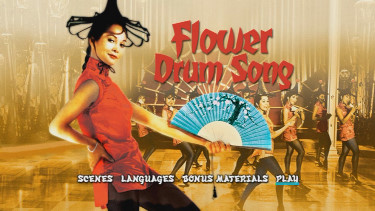 |
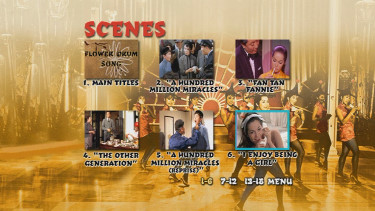 |
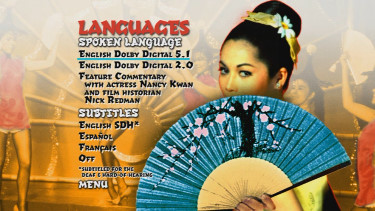 |
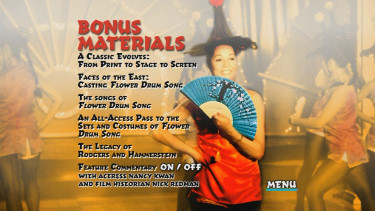 |
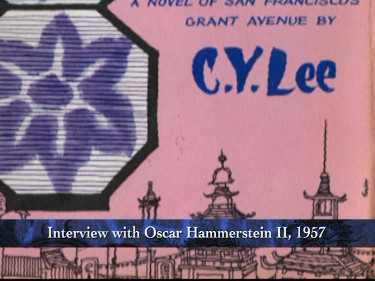 |
 |
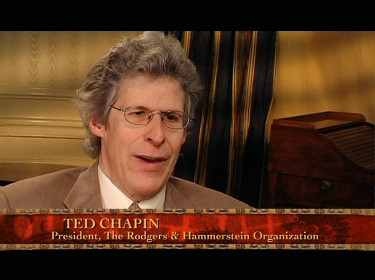 |
 |
Subtitle Sample
.jpg) |
Screen Captures
.jpg) |
Color variances (skin tones)...
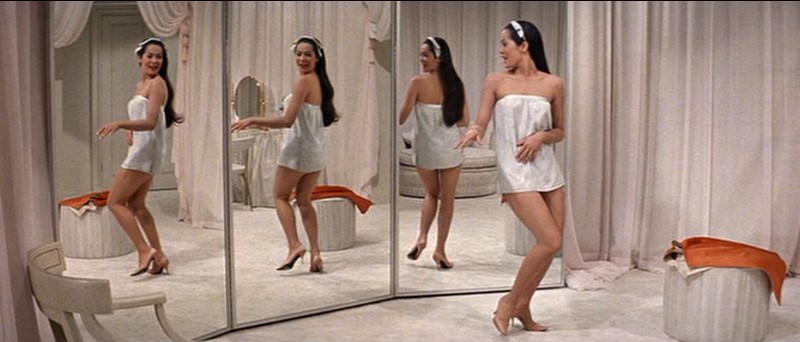 |
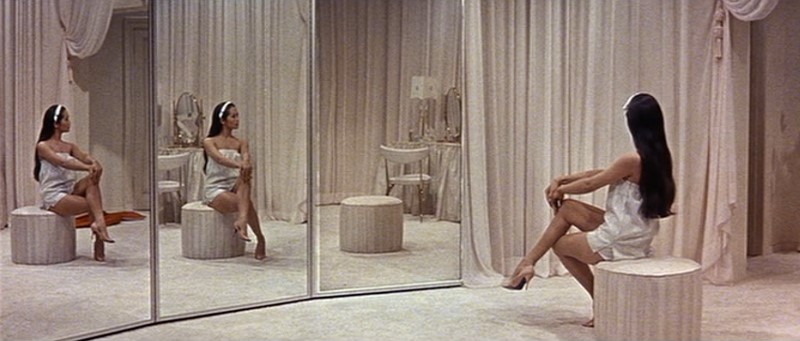 |
.jpg) |
.jpg) |
.jpg) |
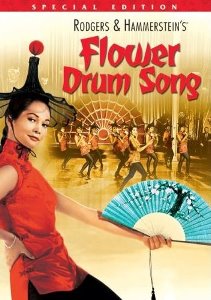

.jpg)
